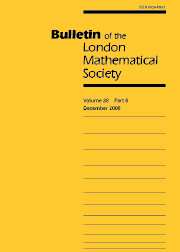Article contents
SERRE'S THEOREM ON THE COHOMOLOGY ALGEBRA OF A p-GROUP
Published online by Cambridge University Press: 01 September 1998
Abstract
The purpose of this note is to give a proof of a theorem of Serre, which states that if G is a p-group which is not elementary abelian, then there exist an integer m and non-zero elements x1, … xm∈H1 (G, Z/p) such that
formula here
with β the Bockstein homomorphism. Denote by mG the smallest integer m satisfying the above property. The theorem was originally proved by Serre [5], without any bound on mG. Later, in [2], Kroll showed that mG[les ]pk−1, with k=dimZ/pH1 (G, Z/p). Serre, in [6], also showed that mG[les ](pk−1)/ (p−1). In [3], using the Evens norm map, Okuyama and Sasaki gave a proof with a slight improvement on Serre's bound; it follows from their proof (see, for example, [1, Theorem 4.7.3]) that mG[les ](p+1) pk−2. However, mG can be sharpened further, as we see below.
For convenience, write H*ast;(G, Z/p)=H*(G). For every xi∈H1(G), set
formula here
- Type
- Notes and Papers
- Information
- Copyright
- © The London Mathematical Society 1998
- 3
- Cited by


